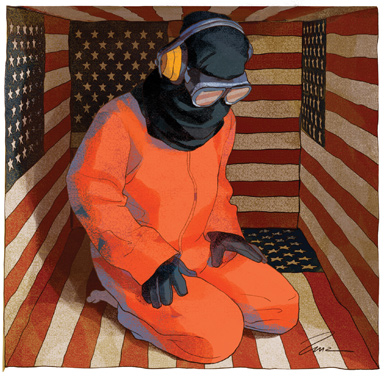
(Artwork by Zina Saunders)
The Arrest and Torture of Syed Hashmi
--An interview with Jeanne Theoharis
By
Jeanne Theoharis is the author of an April, 2009 article in The Nation, entitled “Guantanamo At Home,” which focuses on the arrest, prosecution, and imprisonment of
Syed Hashmi’s trial will begin in
Jeanne Theoharis: In June 2006, Hashmi, who is a
The
The government has claimed that Babar’s testimony is the “centerpiece” of its case. Babar, who has pleaded guilty to five counts of material support for Al Qaida, faces up to seventy years in prison. While awaiting sentence, he has agreed to serve as a government witness in terrorism trials in
A3N: What can you tell us about Hashmi as a person, especially your personal experience of knowing him when he was a student of yours?
JH: Fahad was a student of mine at
A3N: Since his arrest, what have the conditions of his incarceration been?
JH: Under special administrative measures (SAMs) imposed in October 2007 by the former Attorney General, Hashmi must be held in solitary confinement and may not communicate with anyone inside the prison other than prison officials. Family visits are limited to one person every other week for one and a half hours and cannot involve physical contact. While his correspondence to members of Congress and other government officials is not restricted, he may write only one letter (of no more than three pieces of paper) per week to one family member. He may not communicate, either directly or through his attorneys, with the news media. He may read only designated portions of newspapers – and not until thirty days after their publication – and his access to other reading material is restricted. He may not listen to or watch news-oriented radio stations and television channels. He may not participate in group prayer. He is subject to 24-hour electronic monitoring inside and outside his cell – including when he showers or relieves himself – and 23-hour lockdown. He has no access to fresh air and must take his one hour of daily recreation – when it is given – inside a cage.
As the expert testimony supplied by Hashmi’s attorneys in a pre-trial motion of December 2008 attests, the conditions of Hashmi’s detention may have severe physical and mental consequences and impair his mental state and ability to testify on his own behalf.
While former Acting Attorney General Keisler claimed that these measures are necessary because “there is substantial risk that [Hashmi’s] communications or contacts with persons could result in death or serious bodily injury to persons,” Hashmi was held with other prisoners in a British jail for eleven months without incident. The SAMs were renewed by Attorney General Mukasey in November 2008 and upheld by Judge Loretta Preska in January 2009, citing Hashmi’s “proclivity for violence.” There has been no change to the SAMs under the Obama Administration. They were renewed again by Attorney General Holder in early November 2009. Yet, Hashmi is not being charged and has never been charged with committing an actual act of violence.
Currently, according to research by the New York Times in February 2009, there are six people in the United States being held on pre-trial terrorism SAMs; three (including Hashmi) are under the jurisdiction of the Southern District of New York, which has long served as a stepping stone to national political office.
A3N: Looking particularly at the harsh solitary confinement imposed on Hashmi, how is this officially justified? Do you think the stated reason is the actual motivation, or do you think there are other reasons for the solitary confinement and other harsh restrictions?
JH: My colleagues and I have begun to come to the conclusion that the use of prolonged solitary confinement is a tactic to ensure convictions. Such conditions weaken people mentally and the toll of sensory deprivation and isolation simultaneously makes people more eager to take a plea or not able to fully assist their counsel. Most experts agree it is torture (see Atul Gawande's “Hellhole” in The New Yorker). While our public discussions have tended to see torture as a tactic to get information, in cases like Hashmi's, torture is being used to help secure convictions.
A3N: How are the prion conditions for Hashmi in NYC different from those in
JH: There are key similarities of prolonged isolation and sensory deprivation between Hashmi's treatment at MCC in lower
The focus on prisons like
Rather, what made
A3N: With Hashmi’s trial beginning on December 1, what are activists currently doing to support him?
JH: Theaters Against War began holding weekly vigils in October to draw attention to the inhumane conditions of confinement and the due process violations Hashmi and others are facing within the federal courts. Artists and actors such as Wallace Shawn, Kathleen Chalfant, Bill Irwin, Jan Maxwell, Betty Shamieh, and Christine Moore have performed at the vigils.
A3N: Any closing thoughts?
JH: Three central Constitutional issues have become clear in the treatment of Hashmi and others within the federal system: the inhumane conditions of confinement, the abridgement of due process rights , and the lack of 1st Amendment protections.
If these are not addressed, then moving the Guantanamo detainees into the federal system does little to return America to the rule of law, of which we are rightfully proud. I am reminded of that quote by former Chief Justice Earl Warren in 1967, ""It would indeed be ironic if, in the name of national defense, we would sanction the subversion of...those liberties...which [make] the defense of the nation worthwhile."
--
No comments:
Post a Comment
Note: Only a member of this blog may post a comment.